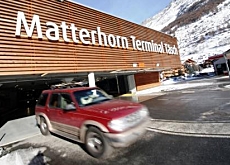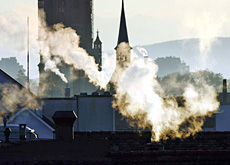Swiss hope to benefit from EU car emission cap

Switzerland sees the latest European Union proposal to cut car emissions as an opportunity to give fresh impetus to its environmental policy.
On Wednesday the European Commission unveiled plans to force vehicle manufacturers to slash greenhouse gas emissions from new cars by almost one fifth within five years.
It said it is planning legislation to ensure the average car manufactured in Europe emits no more than 120 grammes of carbon dioxide (CO2) per kilometre, compared with 162 in 2005.
Switzerland does not have a particularly good record on vehicle emissions, with a high number of vehicles that pollute more than the EU average. According to the Swiss association of car importers, new cars in Switzerland emit an average of 190 grammes per kilometre.
For Michael Kaufmann, deputy director of the Federal Energy Office, the new EU offensive is extremely welcome.
“The proposal from Brussels offers an opportunity for Switzerland to make headway,” he told Swiss radio.
To tackle the problem the Swiss authorities are studying the possibility of imposing higher taxes on imported cars that guzzle petrol and favouring more ecological models.
Welcome
The cantons are also hoping that the European plan will help reduce greenhouse gas emissions.
“EU regulations should be implemented in Switzerland,” said Georg Ganz of the cantonal environment directors’ conference.
Among measures to reduce CO2 emissions, new cars in Switzerland should consume an average of 6.4 litres of fuel per 100 kilometres by 2008 under a voluntary agreement between the car importers and the government.
But this limit, which has already been reached by its European neighbours, might not be attained. In 2005 average consumption was 7.7 litres in Switzerland.
Andreas Burgener, director of Switzerland’s association of car importers, said in principle he welcomed the discussion about lowering CO2 emissions.
“Primarily it is up to countries with a car manufacturing industry – France, Germany, Italy – to find an agreement. But it does not make sense for Switzerland, which does not produce cars, to go it alone,” he told swissinfo.
Spur
European Commissioner for Industry Günter Verheugen urged the car industry to see the commission’s proposal as a spur to innovation.
“We’ll be offering the best, the safest and the cleanest cars in the world,” he said.
Stavros Dimas, the environment commissioner said: “This is the most ambitious target anywhere in the world, but it’s reasonable and realistic.”
The European car industry described the EU target as “arbitrary” and said it would lead to a loss of jobs and relocation of production overseas.
But environmentalists denounced the plan as too little too late and an appeasement of the industry, particularly Germany, whose government and carmakers have been fiercely critical.
The latest proposals are to be turned into draft legislation by early next year and need to be endorsed by the EU’s 27 member states and the European parliament before becoming law, perhaps in 2009.
swissinfo with agencies
Mobility accounts for around 35 per cent of Switzerland’s energy consumption.
One of the main objectives of the SwissEnergy programme, which promotes energy efficiency and the use of renewable energy, is to reduce CO2 emissions from new vehicles to 140 g/km by 2010 – the same as current EU targets – together with reductions in energy consumption and air pollutants.
It also wants to increase the number of gas-powered vehicles to 30,000, hybrid/electric cars to 20,000, and electric bikes to 30,000 by 2010.
SwissEnergy promotes as well the distribution of energy-efficient vehicles, primarily through the use of an energy label for cars.
Carbon dioxide from heating fuel and petrol represented 73.5 per cent of greenhouse gas emissions in Switzerland in 2002, and more than 80 per cent when all sources are taken into account.
The other gases include methane, nitrous oxide and fluorocarbons.
Switzerland’s CO2 law formally came into effect in 2000.
Its objective is to reduce emissions of CO2 arising from fossil fuels by 10% from 1990 levels by 2010. The desired reduction should be achieved by voluntary measures, but if they are not adequate, the government wants to introduce a disincentive tax on fossil energy.

In compliance with the JTI standards
More: SWI swissinfo.ch certified by the Journalism Trust Initiative












You can find an overview of ongoing debates with our journalists here . Please join us!
If you want to start a conversation about a topic raised in this article or want to report factual errors, email us at english@swissinfo.ch.